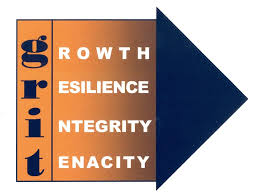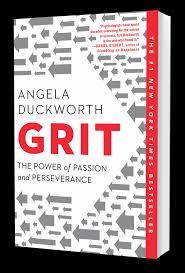

What is the one thing you want for your kids? The single most important thing you want to instill in them? The collective answers may vary some, but most parents would agree that, more than anything, we want to raise people that have the ability to be happy and healthy. We want them to be able to create the lives they desire, to bounce back from adversity – we want them to have grit. And let’s be honest – we want to be gritty too.
The term “grit” has been around a long time, but recently it has been defined in such a way as to be academically measured and researched. Dr. Angela Duckworth has pioneered this work via her research in the Positive Psychology Center at the University of Pennsylvania. She defines grit as “the passion and perseverance for long-term goals.” She has studied grit in the context of West Point Cadets, world-class musicians and athletes, and K-12 students of all backgrounds. While the field is evolving, the work thus far is important and academically sound. It’s very cool stuff. You can learn more here: https://ppc.sas.upenn.edu/people/angela-duckworth
For the sake of this post, I want to focus on how we grow grit. Dr. Duckworth posits that, “If we want our children to have a shot at a productive and satisfying life, we adults should make it our concern to provide them with the two things all children deserve: challenges to exceed what they were able to do yesterday and the support that makes that growth possible.”
It boils down to challenges and support. We need to experience age-appropriate challenges. And we need to feel the feeling of gradually and regularly overcoming those challenges. We need to know what it feels like to practice something that is hard, and then feel it become a little easier the next day. We need to develop a growth mindset – where failure is a cue to try a different way, rather than a cue to get frustrated and give up. We cultivate these good habits in an environment where we are supported to try things, fail, and try again.
As an individual, be someone who seeks these experiences. Try, fail, smile, and try again. As a parent, partner, or friend, be someone who cultivates these experiences for others. Provide your children with age-appropriate challenges. Help them know what focused practice feels like. Help them learn that failure is a cue to try again. Challenge is healthy when we are supported to grow through it. These skills we learn in childhood serve us well our entire lives.
I strongly encourage you to read the book itself, because there are so many important considerations about these principles and how they apply to our lives. You can learn more here: http://angeladuckworth.com/
ACTIONABLE NEXT STEPS:
Think of a challenge that is age-appropriate for your kiddo (or yourself) like practicing piano, soccer, spelling, yoga, Spanish, etc.
Work with them to commit to practicing that challenge for an appropriate amount of time. (Here are examples to start with. Tweak as you see fit.)
Ages 5-8 = 10mins/day; 3 days/week for 2 months
Ages 8-10 = 30mins/day; 3 days/week for 6 months
Ages 10-14 = 1hr/day; 3 days/week for 9 months
Ages 15-18 = 1hr/day; 3 days/week for a year or more
When it gets hard, provide the support they need to stick with it.
When they feel a difficult task getting easier, celebrate that progress!
When they’ve mastered the task or goal, pick another one and do it again.
Go forth! Try! Fail! Try again! Practice! Support your people through adversity! Be gritty and get grittier!

